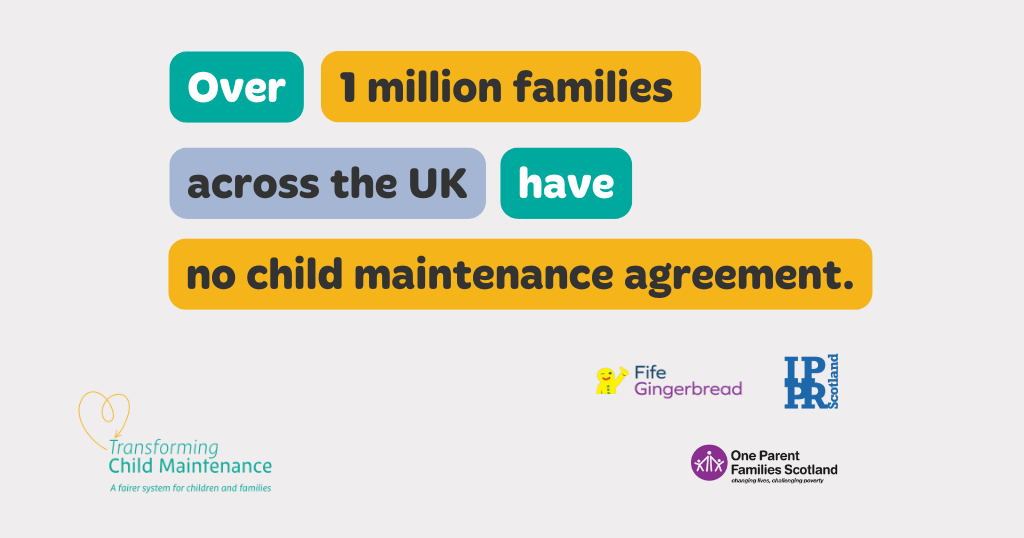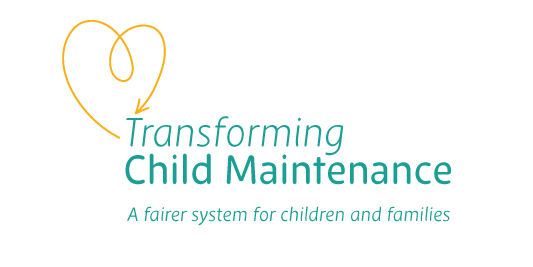Press release: New research – overhaul of broken child maintenance system could help two million children in poverty

22/10/2025
News
Anti-poverty campaigners One Parent Families Scotland and Fife Gingerbread, and the Institute of Public Policy Research (IPPR) Scotland are calling for a reform of the UK Child Maintenance System that could deliver an additional £2.7 billion to two million of the UK’s poorest children (equivalent to £200 million to 100,000 children in Scotland).
- Kira, Single mum
In a new report, Better for Everyone: a new vision for child maintenance, the organisations highlight more than one million separated families across the UK have no child maintenance agreement. This means around two million children may be relying on just one parent to pay for essentials like food, clothes, household bills, school uniforms and out of school care.
The report says the complexity of the current system and the use of fees are putting growing numbers of families off from using it. It accuses the Child Maintenance Service (CMS) of failing both ‘paying’ and ‘receiving’ parents, leaving children to bear the cost. It says that for the most vulnerable families, including those affected by domestic abuse, the system can be impossible to navigate. The report calls for fees to be scrapped and the introduction of a much simpler and safer system in the form of a universal ‘child maintenance payment platform’. The organisations are encouraging people to sign an open letter to the Prime Minster, calling for urgent reform of the child maintenance system.
- Kira, Single mum
Kira, 25, from Fife, is a single mum to a three-year-old and a member of the project’s ‘single parent expert group’.
“I hadn’t planned to have a baby as I was still at university and experiencing homelessness. My ex-partner was really supportive at the time, and we decided we would raise our child together. Everything changed after my 12-week scan. It seemed to really panic my ex-partner and shortly after our relationship broke down.
“Shortly before my son was born, I found out that my ex had moved to London. I was devastated that he had decided to move so far away from his child.
“I knew I had to put in a claim through the CMS. Although I had been working as many hours as possible, money was tight, and I needed to make sure my son would be provided for.
“My ex-partner was working in London, but the CMS based the initial payment on the part-time job he’d had in Fife. I was told I would receive just £58 per month. I was forced to borrow money from friends and family for essentials. It took six months before I was told I should have been receiving around £300 per month. The CMS took action to collect the money from his employer, who initially refused to co-operate. When payments were reviewed, the CMS again defaulted to his old Fife earnings, reducing my payments in error. I spent hours calling CMS, getting different answers from different staff, and there was no record of previous conversations.
“It doesn’t make sense that an organisation like the CMS have no procedures in place for sharing or recording information on individual cases. I am still battling with the CMS to get the money my son is owed. It’s a long, slow process, but I’m not giving up. I just hope the payments come through in time for Christmas.”
- Neil, Single dad
Neil, 42, is a single father to eight-year-old twins, living in Glasgow.
“My ex-partner and I separated when the twins were 10 months old. It had been a difficult relationship, and the separation was challenging for us both.
“We ended up in court to agree custody, and after two years, I was given custody three nights a week – as close to 50/50 as I could get.
“We managed for about two years until my ex decided to move our children an hour away without notice. This made things extremely difficult. I went down to four days a week at work to manage the commute and keep seeing my children regularly.
“When my children started school, my ex changed the custody arrangement to fortnightly contact, directly against the court order. Almost immediately, my child maintenance payments went through the roof, as they are based on nights spent with each parent. So not only am I seeing less of my children, I’m paying more.“The system is open to manipulation and incentivises the receiving parent to reduce contact, which is very damaging to children. CMS told me there was nothing they could do, even though she had broken the court order.
“I feel frustrated there is no transparency around what the child maintenance payments are being used for. Given that I do still see my children and share responsibility for school holidays, I still need to provide three-bedroom accommodation, food and essentials when they’re with me. She doesn’t send the children with a change of clothes, so I pay for these too. Although I would never see my children go without anything they need, it feels like I am paying twice for many of these things. The lack of accountability around payments can breed mistrust in already complicated family situations.
“In my experience, the current Child Maintenance Service offers a one-size-fits-all solution to family situations that are incredibly nuanced. It feels very unfair and needs to change to make things better for parents, and more importantly children across the country.”
- Satwat Rehman, OPFS Chief Executive
Transforming Child Maintenance
Find out more about the Transforming Child Maintenance project, working with parents, practitioners, and policymakers to make the case for a fairer system for children and families.
Read our other single parent stories
Get in touch with to share your own single parent story on our website.
Satwat Rehman, Chief Executive of One Parent Families Scotland said:
“The UK’s disastrous child maintenance system has been failing children for too long. Children in single parent families are nearly twice as likely to live in poverty as those in two-parent households. Child maintenance isn’t a luxury, it’s a lifeline. It’s about children’s rights and parents’ responsibilities. For too long, single parents have been let down by the CMS, especially in cases involving domestic abuse. Our report sets out a bold vision for a child maintenance system that is improved to the extent that all children who are entitled to financial support receive it and, by virtue of this, are lifted out of poverty.”
David Hawkey, Senior Research Fellow at IPPR Scotland, said:
“For years the government has argued that its involvement in families’ child maintenance arrangements is bad for children. It’s time to end this self-fulfilling prophecy. The CMS must transform from a neglected service, available only once maintenance arrangements have broken down, to a modern system that works for all separated families. Our proposal would reduce stigma and improve transparency, safety and access. Extending the reach of child maintenance should be a key plank of any government’s child poverty strategy.”
Laura Millar, CEO of Fife Gingerbread, added:
“Over two years, Fife Gingerbread has engaged with 160 households where 85% had no arrangement in place when we met them. We’ve supported parents across a spectrum of cases: from simple signposting to complex issues like domestic abuse, unpaid arrears and tribunal procedures. This has led, so far, to over £100k financial gain for 40 households in Fife alone, and 87% have consistent payments after a year. We’ve seen what’s possible when parents are supported, but for this to work for every family, the system itself needs to change.”
[ENDS]

